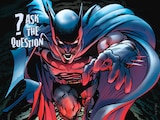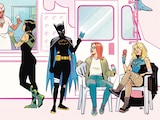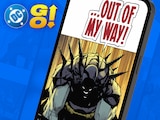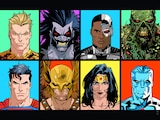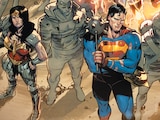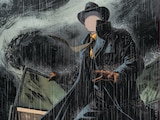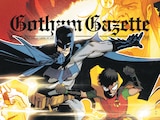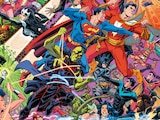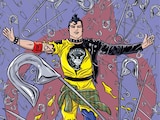Nubia is one of those characters I remember hearing a lot about when I was younger and just getting into comics. Unlike Storm, Vixen, Monica Rambeau, Misty Knight, Amanda Waller, Bumblebee and Rocket, I soon learned she didn’t have nearly as many appearances in comics as I assumed, given how sizable her fan base was—still is and growing. I would say that I was shocked when I learned this, but that wouldn’t be true. The thing about Black folks and the characters they love—especially in comics—is that we tend to breathe life into them in ways that make these characters bigger than what they are, regardless of how little there is canonically for them.
I didn’t get around to reading any of the handful of appearances Nubia had until my twenties. Comics aren’t cheap, and older comics can be pretty hard to find and expensive. Spoiler alert, there was a time when it was challenging to get a hold of certain older comics from the Golden, Silver, and even Bronze Ages, at least before scans of them became readily available online. Still, you had to risk giving your computer a nasty virus to read them. I’m so thankful apps like DC UNIVERSE INFINITE exist for these reasons and more.)

The moment I read Nubia’s very first appearance in Wonder Woman #204, I immediately understood how she managed to garner so much love and adoration with so little page time. How could you not love this character who showed up with armor and silk press ready to battle for the Wonder Woman title from whoever stood in her way? (That just so happened to be Diana Prince of Themyscira.) It was confidence and audacity for me. She pretty much invited herself into someone’s home, kept her shoes on, and sat on their couch with muddy feet. Rick James would be proud.
But what Nubia did at that moment, to me at least, was open the door to Themyscira to women who didn’t look like Diana. After all, it’s supposed to be a paradise, a haven for women who need refuge from a world that can be exceptionally cruel to anyone who isn’t a cishet white male. Why wouldn’t there be other women of all shades welcomed and given a second chance to live on an island where the limitations of Man’s World were nearly nonexistent? And I say nearly because the island’s demographic at the time was very reflective of Man’s World’s thinking of what type of women are deemed worthy enough for that kind of escape, and that’s a limitation.
As a storyteller, that’s all intriguing to me—the chance to explore ideologies and challenge them in fictional settings. Comics have always been a medium I felt did that well and is one of the reasons I have such an undying love for the medium. The superhero genre is at its best when we imagine what good and harm humanity can do in worlds in which aliens from space grow up to be their adopted home world’s most excellent protector and a billionaire playboy plays vigilante at night.

But back to Nubia, who doesn’t win the battle, even though she had Diana dead to rights. Nubia hesitated. The match ended in a draw, and the two women embraced one another, only to meet again and work together to defeat Mars, who had kidnapped Nubia when she was a baby and brainwashed her. There was a possibility to cultivate a sisterhood worth a deeper look.
It was all over the top, including that origin story—yes, that one. All of it seemed like enough of a memorable start to a long and exciting comic book history. Nubia’s presence created a window for a different perspective on how life on Themyscira and its meaning to be an Amazon was examined and explored.
Well, one of those things was confirmed once I caught up with all of her comic history, and it has been interesting. Unfortunately, not much exploring or examining can be done with a character if she isn’t around to do it. After Super Friends #25 in 1979, Nubia wouldn’t see another appearance until some twenty years later in 1999’s Wonder Woman Annual #8.

Fast forward to now, and here I am, doing something I had no idea I’d ever be doing. I’m writing for Nubia. It’s surreal, to be honest, but something I’d like to think I manifested the moment I took an interest in all the things this character created by Robert Kanigher and Don Heck could be, will be and continue to be. A character who stands in no one’s shadow, instead she stands right next to them. My hope is for Nubia to be a household name that doesn’t require the mention of “Diana’s Black sister’ or “The Black Wonder Woman” to jog anyone’s memory. It is past time for her to have an identity canonically that makes her unique and goes beyond her looks or that badass battle armor she showed up in during Wonder Woman #204.
It’s been a dream to work with the likes of Vita Ayala, a non-binary Afro-Latinx comic writer who has been making quite a name for themselves. And then there is the illustrious and widely talented and dedicated Afro-Latina artist Alitha Martinez who is already in the comic hall of fame for all-time greats. Her passion for Nubia is unmatched. It shows in every cover and panel from Nubia’s Future State story written by L.L. McKinney, her Infinite Frontier #0 story written by Becky Cloonan and Michael Conrad, and now the Nubia and the Amazons miniseries written by myself and Vita Ayala.

I’m so excited about the history we’re creating, adding to, and remixing. The foundation has always been there, but needed some TLC. As Nubia embarks on this new journey as Queen of Themyscira, I hope her rebirth will be met with open arms and the desire to keep her always at the forefront. Nubia, now being queen, is poetic in so many ways, but one that stays on my mind is the very personal connection I feel. As I help to add to her legacy, she’s opened the door wider to my own.
Long may Queen Nubia reign, forever and always.
Nubia and the Amazons #1 by Stephanie Williams, Vita Ayala and Alitha Martinez is now available in print and as a digital comic book.




